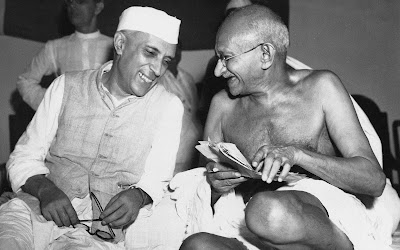Nehru: a meeting of East and West
Today is the
131st birth anniversary of Jawaharlal Nehru, the first Prime
Minister of India. A tribute.
Nehru studied in England for
seven years after which he wrote: “I have become a queer mixture of East and
West, out of place everywhere, at home nowhere.” His profound philosophical and
romantic longings made him out of place in the West while his love of science
and technology rendered him out of place in India.
The India that Nehru inherited
from history’s mishmash was a wretched place. In the words of Dominique
Lapierre and Larry Collins [Freedom at Midnight], India in 1947 was a country
that had a leper population the size of Switzerland. There were as many priests
in India as there were Belgians in Belgium, enough beggars to populate all of
Holland, 11 million holy men, and 20 million aborigines. Some 10 million
Indians were essentially nomads, exercising hereditary occupations as snake
charmers, fortune tellers, gypsies, jugglers, water diviners, magicians,
tight-rope walkers, and herb vendors. About 38,000 Indians were born every day,
a quarter of them to die before the age of 5. Ten million other Indians died
each year from malnutrition, undernourishment, and diseases like smallpox.
But India was very religious.
It was the motherland of a historical religion (which ironically is still
searching for its roots and striving to get a facelift). It was the birthplace
of Buddhism, Jainism, and Sikhism: all pre-eminent religions that put a premium
on humaneness. It was also a country of a sizeable population of Muslims who
chose to stay back in spite of the agonising Partition. Over 3 million deities
watched over this new country.
Nehru was an agnostic,
however. The plethora of gods horrified him. He knew they would serve no
practical purpose in redeeming a country steeped in poverty, diseases, ignorance,
and superstitions. The very word ‘religion’ horrified him. He despised the
priests, sadhus, chanting monks, and fervent sheikhs. The gods and their men
together impeded the country’s progress, Nehru was convinced.
Nehru sought to replace these serious
impediments with his own version of secularism. Secularism was more of a
Western concept than Indian. But Nehru Indianized it by being philosophically
tolerant of religions instead of excluding them altogether. Nehru’s secularism
is one of his most profound contributions to the country. Unfortunately that
hybridisation of the West and the East was never rightly understood or
implemented in the country. Even the Congress successors of Nehru failed in
this regard. Instead of keeping religions confined to temples and the personal dark
alleys and byways where they belong, the Congress used them as vote banks and
corrupted the entire polity of the nation. It is this corruption, more than
anything else, that cost the Congress heavily, so heavily that the party is on
the verge of extinction today. Worse, the very thing that Nehru tried to put on
the sidelines has emerged as the strongest force in the country, threatening to
swallow the whole nation.
The greatest irony, however,
is that today’s leaders who have replaced Nehru in the heart of Delhi lack any
profundity or vision. Their religion is just a political tool and little more.
Their vision is stuck on some gargoyles of an unduly glorified past. They splash
in the bilge waters of history and imagine that they are grappling with the
tides of future destiny.
Like all humans, Nehru too had
his flaws and limitations. But those flaws and limitations were just little
stains on a fabric that shone brilliantly otherwise. If he did not fit in well
anywhere, it was because people were incapable of seeing beyond those small
stains. Nehru belonged to the cosmos. That is why the east and the west met in
him harmoniously.

Agree with your assessment in the last para of the post.
ReplyDeleteOnly with the last para?
DeleteAnyway, that's the summary of the post.
Well, yes I mentioned the last para as it summarizes everything. It is painful to see a great patriot who always had the best interests of the nation being maligned so often these days.
DeleteI agree with each and every word of this post. In my humble view, the biggest contribution of Nehru to the democracy called India was, is and will remain to be the establishment and strengthening of democratic institutions which used to serve the system as its checks and balances, making it truly accountable. Today's rulers (who leave no stone unturned in vilifying Nehru) have virtually destroyed almost all of them, making a mockery of democracy in India.
ReplyDelete